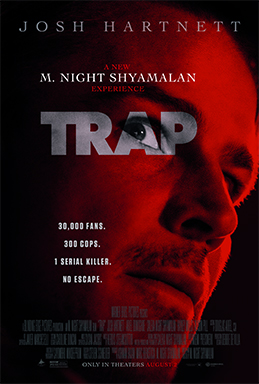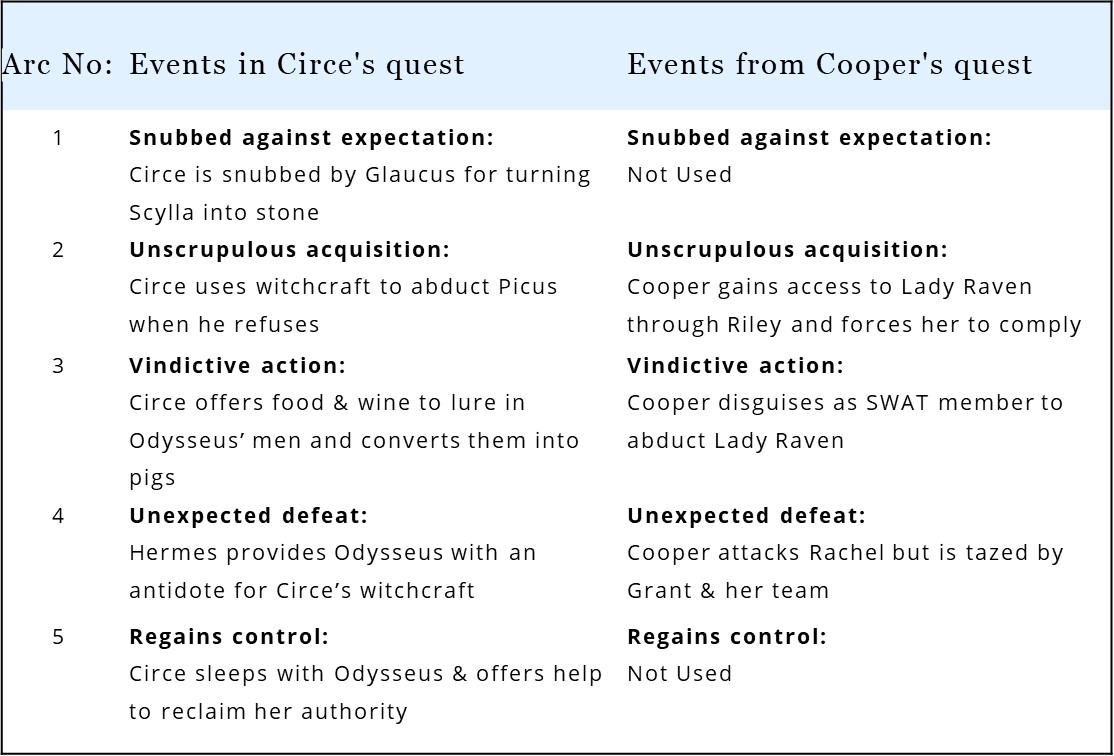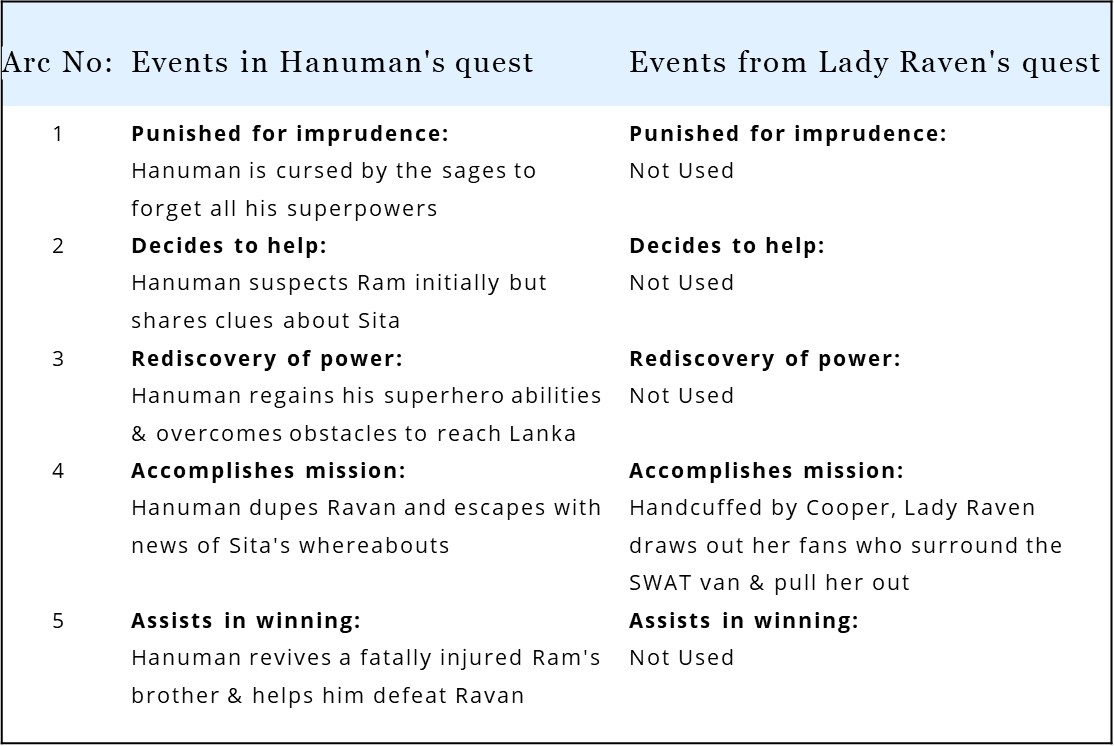Trap forgets craft of storytelling... trips on twists and turns

-
Est vs Actual domestic box office revenue:
$23 - 40/$42MM
Trap, directed by Night Shyamalan is about a serial killer outsmarting his apprehenders with luck and chance rather than intelligence. The story explores basic human desires of power, sacrifice & idealism. Mythosis extracts the plot structure of the movie with 3 mythological tales to estimate and unlock its potential.
1. Mythological tales reveal the invisible plot structure of any story
1A. 87% of the events are borrowed from 3 mythological tales
Cooper’s quest is driven by the desire to dominate others and mirrors the tale of Circe from Greek mythology. Both Circe & Cooper create a façade of godliness to dupe others.
Lady Raven’s quest is driven by the desire to sacrifice self for serving others and mirrors the tale of Hanuman from Hindu mythology. Both Hanuman & Lady Raven help in finding the abductor.
Rachel has an underdeveloped quest driven by the desire to uphold justice and mirrors a few events from the tale of Prometheus from Greek mythology. Both Prometheus & Rachel turn idealistic and rebel against their own.
Grant, Riley & Jaime have non-existent quests.
Detailed mirroring of each character’s primary quest to their respective mythological tales is in section “3A. Quests of characters and their mythological counterparts”
Lady Raven’s quest is driven by the desire to sacrifice self for serving others and mirrors the tale of Hanuman from Hindu mythology. Both Hanuman & Lady Raven help in finding the abductor.
Rachel has an underdeveloped quest driven by the desire to uphold justice and mirrors a few events from the tale of Prometheus from Greek mythology. Both Prometheus & Rachel turn idealistic and rebel against their own.
Grant, Riley & Jaime have non-existent quests.
Detailed mirroring of each character’s primary quest to their respective mythological tales is in section “3A. Quests of characters and their mythological counterparts”
1B. 32 mythological tales are the source of all stories, even the untold ones
Human beings are driven by 16 fundamental desires. Every desire, whether encountering fulfilment or unfulfillment, gives rise to two distinct quests. Thus, a spectrum of 32 unique quests mirrors every human desire.
We have discovered mythological tales from across civilizations that uniquely portray each one of these 32 human quests. While each mythological tale stands as a distinct quest, the true magic unfolds when these tales are combined. This synergy is evident in the epics of Odyssey and Ramayan, where various universal quests seamlessly intertwine.
Combining any five tales from the 32, generates a staggering 24 million unique story plots. Take it a step further, by combining six tales the possibilities explode to an astounding 600 million!
The unique plot structure of Trap is # 298. It emerges from interweaving the tales of Circe & Hanuman.
We have discovered mythological tales from across civilizations that uniquely portray each one of these 32 human quests. While each mythological tale stands as a distinct quest, the true magic unfolds when these tales are combined. This synergy is evident in the epics of Odyssey and Ramayan, where various universal quests seamlessly intertwine.
Combining any five tales from the 32, generates a staggering 24 million unique story plots. Take it a step further, by combining six tales the possibilities explode to an astounding 600 million!
The unique plot structure of Trap is # 298. It emerges from interweaving the tales of Circe & Hanuman.
2. Plot structure potential of Trap: $23 – 40 MM
2A. Plot structure evaluation
An analysis of Blockbuster, Hit & Flop plots has led to the discovery of Mythosis Code. The Code reveals the story principles shared by all Blockbusters. We use the Code to estimate a story’s potential.
- All Blockbusters have at least 3 universal quests. Trap uses 2 universal quests of Power and Honour.
- In Blockbusters, each universal quest is mirrored by ONLY ONE character. Lady Raven mirrors the universal quest of Honour. Cooper mirrors the universal quest of Power.
- Every Blockbuster character borrows at least 35% of the universal quest. Lady Raven borrows 10% from the quest of Honour. Cooper borrows 24% from the universal quest of Power.
- Blockbusters interweave different quests to create a tight plot structure. Interweaving occurs when events of 2 quests occur simultaneously in the story. Blockbusters have a quest interweaving threshold of 0.5. The quest interweaving score of Trap is 0.33 and is below par. An example of interweaving the quests of Cooper & Lady Raven:

2B. Estimating revenue potential from the plot structure
The script of Trap doesn't adhere to any of the first principles of storytelling.
We have created an algorithm by assigning weights to the principles of The Mythosis Code. The algorithm calculates the potency of a story’s plot structure and estimates its corresponding audience appeal. Blockbuster plot structures have a score of at least 0.64 and appeal to 20% of the audiences.
Trap has a script potential score is 0.02 and the movie will appeal to 0.64 – 0.78% of the population. Our estimate of the movie’s revenues from its audience appeal is $23 – 40MM in the domestic market.
We have created an algorithm by assigning weights to the principles of The Mythosis Code. The algorithm calculates the potency of a story’s plot structure and estimates its corresponding audience appeal. Blockbuster plot structures have a score of at least 0.64 and appeal to 20% of the audiences.
Trap has a script potential score is 0.02 and the movie will appeal to 0.64 – 0.78% of the population. Our estimate of the movie’s revenues from its audience appeal is $23 – 40MM in the domestic market.
3. The ideal plot structure of Trap
We have identified 32 universal quests that represent every human desire. These quests are the superset of thousands of stories across cultures that reflect our collective subconscious. Each quest has a structured sequence of events divided into 5 major arcs.
We map a character’s quest to the relevant mythological tale (universal quest) which reveals the gaps in their quest, if any. The ideal Plot Structure is constructed by plugging these gaps with the missing events from the tale. These events strengthen both the journey of characters as well as the weaving of quests without altering the story.
We map a character’s quest to the relevant mythological tale (universal quest) which reveals the gaps in their quest, if any. The ideal Plot Structure is constructed by plugging these gaps with the missing events from the tale. These events strengthen both the journey of characters as well as the weaving of quests without altering the story.
3A. Quest of characters and their mythological counterparts
Quest 1: Cooper mirrors the universal quest for Power
Cooper’s desire for Power stems from the need to dominate others. The tale of Circe from Greek mythology is the universal fulfilled quest for Power.

Quest 2: Lady Raven mirrors the universal quest for Honour
Lady Raven’s desire for Honour stems from the need to sacrifice self for clan/order. The tale of Hanuman from Hindu mythology is the universal quest for Honour.

3B. Gaps in the current plot structure
The plot structure of Trap comprises shallow quests of Cooper & Lady Raven
It doesn't build on the motivations of Rachel or Grant to create powerful quests for them
Cooper mirrors the tale of Circe but unlike her quest, Cooper's quest is a result of chance rather than effort.
It doesn't build on the motivations of Rachel or Grant to create powerful quests for them
Cooper mirrors the tale of Circe but unlike her quest, Cooper's quest is a result of chance rather than effort.
3C. Unlocking the hidden potential
A redraft of the script is necessitated by the fact that Trap doesn’t adhere to any of the first principles of storytelling.
Even though Grant doesn’t have a quest in the story, she has a clear objective of apprehending a serial killer. The universal quest of Order is driven by the desire to maintain stability. The tale of Ram from Hindu mythology represents the universal quest of Order.
The universal quests of Order, Power & Honour unlocks the hidden potential of Trap. This quest has been mirrored by Clarice in Silence of the Lambs.
Even though Grant doesn’t have a quest in the story, she has a clear objective of apprehending a serial killer. The universal quest of Order is driven by the desire to maintain stability. The tale of Ram from Hindu mythology represents the universal quest of Order.
The universal quests of Order, Power & Honour unlocks the hidden potential of Trap. This quest has been mirrored by Clarice in Silence of the Lambs.
- Tags: 2024, Blinding Edge Pictures, Blockbuster movies, Circe, Hanuman, Honour, M. Night Shyamalan, Mythology, Plot Structure, Power, Prediction, storytelling, Warner Bros. Pictures
